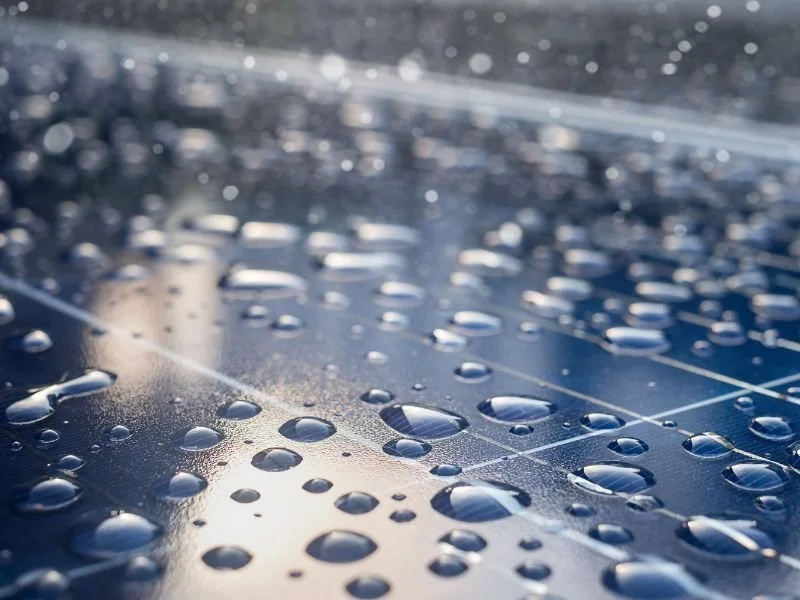Does Solar Work on Cloudy or Rainy Days? Understanding Solar Panel Efficiency
Many homeowners considering solar energy wonder, "How efficient are solar panels in cloudy weather?" or "Can solar panels produce energy on rainy days?" The short answer is yes—solar panels can still generate electricity even when the sky is overcast. However, the efficiency of solar panels depends on several factors, including the type of panels, seasonal variations, and how well the system is optimized. Understanding how solar panels perform in winter, cloudy weather, and low-light conditions can help homeowners maximize energy production year-round.
How Efficient Are Solar Panels in Cloudy Weather?
Solar panels rely on sunlight to generate electricity, but they don’t require direct sunlight to function. Even on cloudy days, diffuse sunlight penetrates the atmosphere, allowing panels to continue producing power—just at a reduced efficiency. The amount of energy solar panels generate during overcast conditions depends on cloud density and the type of solar technology used.
On average, solar panels operate at 10% to 25% of their normal efficiency on heavily overcast days. High-efficiency panels with monocrystalline cells perform better in low-light conditions than their polycrystalline counterparts. Additionally, clouds can sometimes enhance solar output through the edge-of-cloud effect, where sunlight is momentarily intensified as it passes through cloud edges. This can result in brief spikes in energy production despite the overcast sky.
Certain locations, such as the Pacific Northwest or Northern Europe, experience frequent cloudy days yet still benefit from solar energy. Germany, for example, is a global leader in solar power despite its often gray skies. This proves that even in cloudy climates, solar panels remain a viable and cost-effective energy solution.
Do Solar Panels Work in Winter Months?
One common misconception is that solar panels stop working in winter, but this isn’t true. While shorter days mean fewer hours of sunlight, the cold temperatures can actually improve solar panel efficiency. Solar cells perform best at lower temperatures, as excessive heat can reduce their output. This means that a cold, sunny winter day can generate as much, if not more, power than a hot summer day.
However, the main challenge during winter is snow accumulation. If panels are covered in a thick layer of snow, sunlight can’t reach the solar cells, temporarily reducing energy production. The good news is that solar panels are designed with smooth, tempered glass surfaces, allowing snow to slide off easily, especially on steeper roofs. Many modern solar systems also include tilt adjustments or self-heating features that help prevent heavy snow buildup.
For homeowners in areas with long winters, installing high-efficiency panels and optimizing panel angles to capture more winter sunlight can help maintain energy production throughout the season.
Best Solar Panels for Low-Light Conditions
Not all solar panels are created equal when it comes to low-light performance. Some panels are specifically designed to maximize energy production in cloudy, shaded, or overcast environments.
Top Features of High-Performance Low-Light Solar Panels:
Monocrystalline Cells: More efficient than polycrystalline panels in low-light conditions.
PERC (Passivated Emitter and Rear Contact) Technology: Enhances light absorption, improving performance on cloudy days.
Bifacial Panels: Capture sunlight from both sides, increasing efficiency in diffused lighting.
Half-Cut Cell Design: Reduces energy loss and improves overall panel performance in partial shade.
Some of the best solar panel brands for low-light conditions include SunPower, LG, Panasonic, and REC, all of which are known for their advanced technology and superior efficiency. Choosing the right panels for your climate can significantly impact long-term energy production, especially in areas prone to overcast weather.
Can Solar Panels Produce Energy on Rainy Days?
Yes, solar panels still produce energy on rainy days, but at a lower capacity than on clear days. Rainy weather typically reduces solar output to 10-20% of normal production, but this depends on the level of cloud cover. However, rain provides an unexpected benefit: it helps clean solar panels, removing dust, pollen, and dirt that can accumulate over time and reduce efficiency.
If your area experiences frequent rain or long periods of overcast weather, installing a solar battery storage system can help store excess power from sunnier days for use when sunlight is limited. Additionally, positioning panels at an optimal angle ensures they receive the maximum amount of available sunlight, even during rainy conditions.
While rain affects solar efficiency, it does not completely halt energy generation. In fact, locations with high annual rainfall, such as Seattle or London, still successfully utilize solar energy as a reliable power source.
How to Optimize Solar Energy Production Year-Round
To ensure consistent solar energy production throughout all seasons, homeowners can take a few proactive steps to maximize their system’s performance.
Install High-Efficiency Solar Panels: Choose monocrystalline or PERC panels for better performance in cloudy or low-light conditions.
Optimize Panel Angles: Adjust the tilt to capture the most sunlight, especially during winter months.
Use a Solar Battery Storage System: Store excess power generated on sunny days to use during cloudy or rainy periods.
Keep Panels Clean: Regularly remove dirt, dust, and snow to maintain peak efficiency.
Monitor Energy Output: Use solar monitoring software to track production levels and detect any issues early.
Implementing these strategies ensures that your solar system performs efficiently year-round, regardless of weather conditions.
Final Thoughts: Solar Energy Works in Any Weather
While solar panels are most efficient in direct sunlight, they still generate power on cloudy, rainy, and even snowy days. Advances in solar technology allow modern panels to capture and convert diffused sunlight, ensuring consistent energy production even in less-than-ideal weather. By selecting high-efficiency panels, maintaining proper installation angles, and incorporating solar battery storage, homeowners can maximize solar performance throughout the year.
If you’re considering solar but worried about cloudy weather, WSC Solar can help design a system tailored to your climate and energy needs. Contact us today for a free consultation and take the next step toward reliable, renewable energy!

